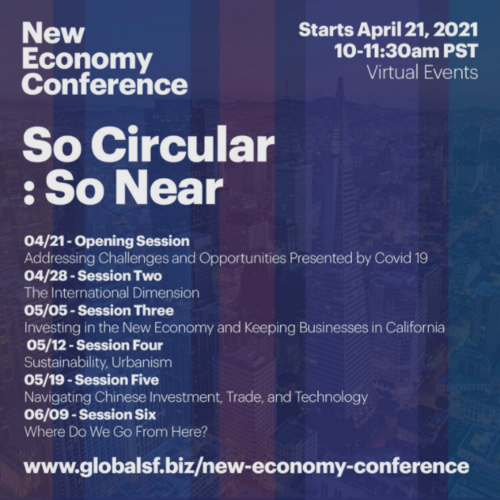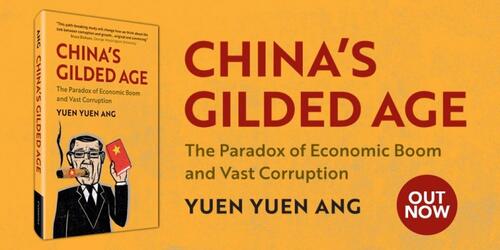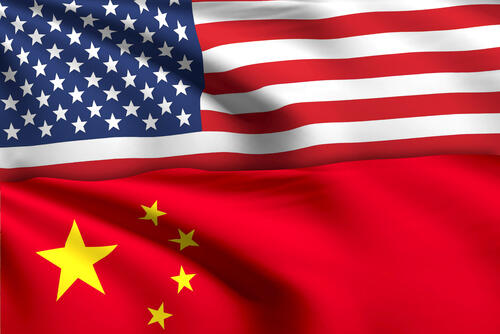Purposeful Mentorship is Key to Cultivating Leaders, Empowering Women
All successful leaders stand on the shoulders of those who believed in them – people who saw potential they may not have recognized in themselves and helped them find and achieve their purpose, Dina Powell McCormick told a full audience in Stanford’s Bechtel Conference Center on April 14.
A former deputy national security adviser, Powell McCormick discussed her new book, Who Believed in You?: How Purposeful Mentorship Changes the World, with Sheryl Sandberg, former chief operating officer of Meta, at an event hosted by the Freeman Spogli Institute for International Studies (FSI). Her career includes service at the highest levels of the U.S. government and Wall Street. She is currently the vice chairman of BDT & MSD Partners. Powell McCormick’s husband, Sen. Dave McCormick (Pa.), was the co-author of the book.
Condoleezza Rice, senior fellow (by courtesy) at FSI and director of the Hoover Institution, introduced Powell McCormick and spoke about their time together working at the U.S. Department of State during the George W. Bush Administration.
Rice said, “She headed education and cultural affairs at a time when we were reaching out as the United States to people who wanted to find the basic liberties that we all enjoy. And, I think it’s fair to say she taught me just about everything that I know about the Middle East.”

Transformative Mentorship
Powell McCormick said that Rice was the mentor who had the most impact on her life. She and her husband have six daughters, and during COVID, they began to realize the critical need for purposeful mentorship across society.
“It went way past high school graduations and proms that they didn't get to attend,” said Powell McCormick of her daughters’ experience during the pandemic. “It was those first seminal years of having a professor that believed in you, of having a boss that helped you and gave you tough love. And so, we started talking to the girls about the fact that Dave and I wouldn't be where we are today without people who really believed in us and invested in us.”
She started asking people she admired to pinpoint one or two people who had invested in them and contributed to who they are. Her husband recounted a high school experience where his football coach had made a difference in his life by naming him co-captain on the team.
“Dave had never thought of himself as a leader. And that single act is the reason my husband got into West Point – through that coach and being on that football team,” Powell McCormick said.
![Sheryl Sandberg [left] and Dina Powell McCormick [right] onstage in front of an audience at the Freeman Spogi Institute for International Studies.](https://fsi9-prod.s3.us-west-1.amazonaws.com/s3fs-public/styles/680x378/public/2025-04/who_believed_in_you_dina_powell_mccormick_2_hero.png?itok=j0ztazKE)
Advocating for Freedom, Democracy
Sandberg noted that Powell McCormick came to America at age 5 from Egypt and spoke no English. She asked her, “How did mentors contribute to your success?”
Powell McCormick mentioned Kay Bailey Hutchinson, a senator from Texas, “the only woman I'd ever seen in a senior role, to be honest, in Texas at that time.” Hutchinson took an interest in the career growth of a young Powell McCormick.
“She would mentor me and as I was graduating and heading to law school, she said, ‘I think you should come intern for me for a year in Washington.’”
She never forgot what the senator told her: “If you don’t take a risk on yourself, no one else ever will.” Eventually, Powell McCormick worked on the Hill and then in the White House where she met Rice, then Secretary of State. They were both there on 9/11, and Rice asked her to expand her responsibilities. “It changed everything.”
During that time, Powell McCormick recalled an inspirational moment with Rice on a visit to a Middle Eastern country where Rice was asked by a foreign leader about whether she was going to “preach freedom and democracy” to that country’s leadership.
Rice replied, “Your highness, how can I come and preach to you when not that long ago my own country counted my ancestors as three-fifths of a man. Today, you are looking at the first black Secretary of State of the United States of America, and the difference between my country and yours is that we will always be stronger because we hear the will of our people.”
In that moment, Powell McCormick said, Rice had taught her so much – “fierceness, grace, and humility.”
In their book, the couple interviewed successful leaders across industries who benefited from their mentors and shares their real-world stories of how their career trajectories were impacted. The book outlines four key elements of transformative mentorship – trust, shared values, meaningful commitment, and instilling confidence.
Powell McCormick said, “Being an entrepreneur, you’re on an island all by yourself. It’s really scary, and particularly we learned this is true for female entrepreneurs outside of the United States.”
She recalled working with a female entrepreneur in Egypt at the American University in Cairo who had an abusive husband and who had secretly started a taxi business (and hid this from her husband).
Powell McCormick told her, “This is incredible. You’ve got to buy another car. You’ve got to do all of this. And so, we helped her with capital, we helped her with education. When she finally told her husband, she thought he was going to freak out and divorce her.”
But then the woman showed him how much money she was making. “Today he is her CFO (chief financial officer) and reports to her,” Powell McCormick said.
![[Left to right]: Juliet deBaubigny, Sheryl Sandberg, Dina Powell McCormick, Condoleezza Rice; Marne Levine](https://fsi9-prod.s3.us-west-1.amazonaws.com/s3fs-public/styles/680x378/public/2025-04/who_believed_in_you_dina_powell_mccormick_3_hero.png?itok=B1r9B5ux)
‘She Could Do It’
In addition to Rice, the book features stories from some of the most influential leaders across industries, including Satya Nadella, the CEO of Microsoft, Tory Burch, the founder of the women’s fashion empire, Hollywood producer Brian Grazer, as well as political leaders such as Arkansas Gov. Sarah Huckabee Sanders and Maryland Gov. Wes Moore.
Powell McCormick spoke about an Afghanistan businesswoman, Rangina Hamidi, who sold rugs, jewelry, and handicrafts, and then returned the proceeds every month to aspiring female entrepreneurs. Once, a young woman who she was helping told her that her husband had never respected her. But since she had started making money, he began supporting education for females – and especially for their five daughters.
“That woman who will never leave her home, who is illiterate, changed the course of a generation of her family by being a little bit economically independent – because someone told her she could do it,” Powell McCormick said.
Read More
In a conversation about her new book, former deputy national security advisor Dina Powell McCormick explained why mentorship is one of the most powerful forces that can shape a leader’s path forward.




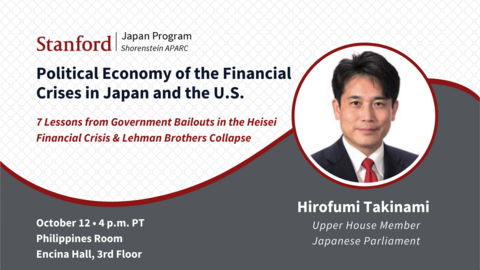





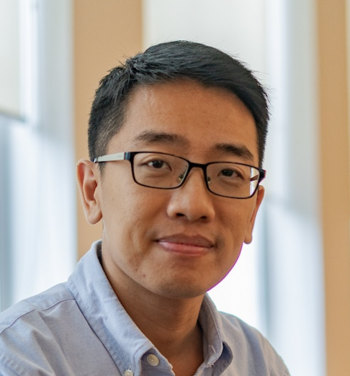




 Craig Allen began his tenure in Washington, DC, as the sixth President of the United States-China Business Council, a private, nonpartisan, nonprofit organization representing over 200 American companies doing business with China. Ambassador Allen began his government career in 1985 at the Department of Commerce’s International Trade Administration (ITA) where, from 1986 to 1988, he worked as an international economist in ITA’s China Office. In 1988, Allen transferred to the American Institute in Taiwan, where he served as Director of the American Trade Center in Taipei. He returned to the Department of Commerce for a three-year posting at the US Embassy in Beijing as Commercial Attaché in 1992. In 1995, Allen was assigned to the US Embassy in Tokyo where he was promoted to Deputy Senior Commercial Officer in 1998. Allen became a member of the Senior Foreign Service in 1999. Starting from 2000, he served a two-year tour at the National Center for APEC in Seattle where he worked on the APEC Summits in Brunei, China, and Mexico. In 2002, Allen first served as the Senior Commercial Officer in Beijing where he was later promoted to the Minister Counselor rank of the Senior Foreign Service. After a four-year tour in South Africa, Ambassador Allen became Deputy Assistant Secretary for Asia at the US Department of Commerce’s International Trade Administration. He later became Deputy Assistant Secretary for China. Ambassador Allen was sworn in as the United States ambassador to Brunei Darussalam on December 19, 2014 where he served until he transitioned to take up his position as President of the US-China Business Council.
Craig Allen began his tenure in Washington, DC, as the sixth President of the United States-China Business Council, a private, nonpartisan, nonprofit organization representing over 200 American companies doing business with China. Ambassador Allen began his government career in 1985 at the Department of Commerce’s International Trade Administration (ITA) where, from 1986 to 1988, he worked as an international economist in ITA’s China Office. In 1988, Allen transferred to the American Institute in Taiwan, where he served as Director of the American Trade Center in Taipei. He returned to the Department of Commerce for a three-year posting at the US Embassy in Beijing as Commercial Attaché in 1992. In 1995, Allen was assigned to the US Embassy in Tokyo where he was promoted to Deputy Senior Commercial Officer in 1998. Allen became a member of the Senior Foreign Service in 1999. Starting from 2000, he served a two-year tour at the National Center for APEC in Seattle where he worked on the APEC Summits in Brunei, China, and Mexico. In 2002, Allen first served as the Senior Commercial Officer in Beijing where he was later promoted to the Minister Counselor rank of the Senior Foreign Service. After a four-year tour in South Africa, Ambassador Allen became Deputy Assistant Secretary for Asia at the US Department of Commerce’s International Trade Administration. He later became Deputy Assistant Secretary for China. Ambassador Allen was sworn in as the United States ambassador to Brunei Darussalam on December 19, 2014 where he served until he transitioned to take up his position as President of the US-China Business Council.
 James Green has worked for over two decades on U.S.-Asia relations. For five years, Green was the Minister Counselor for Trade Affairs at the U.S. Embassy in Beijing (2013-2018). As the senior official in China from the Office of the United States Trade Representative (USTR), Green was deeply involved in all aspects of trade negotiations, trade enforcement, and in reducing market access barriers for American entities. In prior government service, Green worked on the Secretary of State’s Policy Planning Staff and at the State Department’s China Desk on bilateral affairs. He also served as the China Director of the White House’s National Security Council. In the private sector, Green was a senior vice president at the global strategy firm founded by former Secretary of State Madeleine Albright and was the founding government relations manager at the American Chamber of Commerce in Shanghai, Asia’s largest AmCham. Currently, Green is a Senior Research Fellow at Georgetown University's Initiative for U.S.-China Dialogue on Global Issues and hosts a U.S.-China Dialogue Podcast. He was most recently named as
James Green has worked for over two decades on U.S.-Asia relations. For five years, Green was the Minister Counselor for Trade Affairs at the U.S. Embassy in Beijing (2013-2018). As the senior official in China from the Office of the United States Trade Representative (USTR), Green was deeply involved in all aspects of trade negotiations, trade enforcement, and in reducing market access barriers for American entities. In prior government service, Green worked on the Secretary of State’s Policy Planning Staff and at the State Department’s China Desk on bilateral affairs. He also served as the China Director of the White House’s National Security Council. In the private sector, Green was a senior vice president at the global strategy firm founded by former Secretary of State Madeleine Albright and was the founding government relations manager at the American Chamber of Commerce in Shanghai, Asia’s largest AmCham. Currently, Green is a Senior Research Fellow at Georgetown University's Initiative for U.S.-China Dialogue on Global Issues and hosts a U.S.-China Dialogue Podcast. He was most recently named as 
